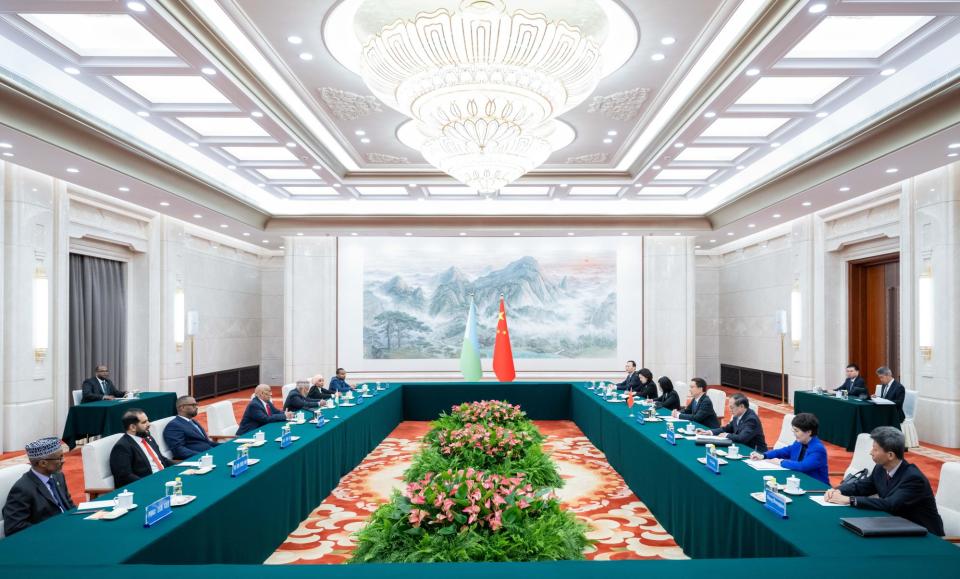China's top lawmaker vows to share governance notes with Djibouti, deepen belt and road ties
China is willing to exchange notes with Djibouti on state governance and deepen cooperation under the Belt and Road Initiative, the country's top legislator has said.
Zhao Leji, chairman of the National People's Congress Standing Committee, China's top legislative body, made the comments as he met Djiboutian counterpart Dileita Mohamed Dileita in Beijing on Tuesday to mark 45 years of diplomatic ties.
"[China is] ready to deepen cooperation [with Djibouti] under the Belt and Road Initiative, strengthen strategic alignment, and expand cooperation on ports, free trade parks, investment and infrastructure construction," Zhao was quoted as saying by Chinese state news agency Xinhua.
Do you have questions about the biggest topics and trends from around the world? Get the answers with SCMP Knowledge, our new platform of curated content with explainers, FAQs, analyses and infographics brought to you by our award-winning team.
Djibouti, a tiny Horn of Africa nation facing the oil-rich Arabian peninsula, is strategically significant because of its maritime location. It sits at the intersection of the Gulf of Aden and the Red Sea - the gateway to the Suez Canal through which 10 per cent of the world's oil exports and 20 per cent of all commercial goods travel.
It is also one of more than 50 African countries to have signed up for Beijing's trillion-dollar belt and road infrastructure programme, and is an important node in the plan's maritime section seeking to connect China to the rest of Asia, and Africa and Europe.
"China is willing to work with Djibouti to strengthen exchanges of experience in state governance on the basis of mutual respect for each other's choice of development path and institutional model," Zhao told Dileita, speaker of the National Assembly of Djibouti.
He also pledged support for Djibouti "in safeguarding its national sovereignty, security and stability [and] in independently exploring a development path suited to its national conditions", according to Xinhua.
Djibouti is home to several foreign military bases, including China's only overseas military base - set up in 2017.
China says Djibouti is ideally placed for operations to resupply its peacekeeping and humanitarian missions in Africa, and combat piracy off the Yemen and Somalia coasts - a region where Western countries have long been the dominant external security actors.
Apart from the United States' only military base in Africa, Camp Lemonnier, Djibouti accommodates the militaries of several American allies, including Italy, Germany, Spain, France and Japan.
Zhao also called for deeper exchange of legislative and supervisory experiences with Djibouti and closer cooperation on education, culture, health and local affairs.
Dileita spoke of "fruitful results" gained from cooperation on politics, the economy, culture and people's livelihoods, the Xinhua report said. The National Assembly of Djibouti was willing to "strengthen friendly exchanges" with the NPC, he was quoted as saying.

Chinese Vice-President Han Zheng and other Chinese officials hold talks with Djiboutian legislative speaker Dileita Mohamed Dileita and his delegation in Beijing. Photo: Xinhua alt=Chinese Vice-President Han Zheng and other Chinese officials hold talks with Djiboutian legislative speaker Dileita Mohamed Dileita and his delegation in Beijing. Photo: Xinhua>
Dileita also met Vice-President Han Zheng, who reaffirmed Beijing's commitment to promoting cooperation on investment, financing and infrastructure, and pledged to support Djibouti in promoting the 2035 Vision for China-Africa Cooperation - a framework adopted two years ago.
China has invested heavily in infrastructure in Djibouti and the wider Horn of Africa region under its belt and road strategy.
The Chinese-built Ethiopia-Djibouti standard gauge railway, also known as the Addis Ababa-Djibouti railway, was Africa's first electrified transboundary railway and a flagship belt and road project. Operations began in 2017, with some staff training still continuing in China.
This article originally appeared in the South China Morning Post (SCMP), the most authoritative voice reporting on China and Asia for more than a century. For more SCMP stories, please explore the SCMP app or visit the SCMP's Facebook and Twitter pages. Copyright © 2024 South China Morning Post Publishers Ltd. All rights reserved.
Copyright (c) 2024. South China Morning Post Publishers Ltd. All rights reserved.
